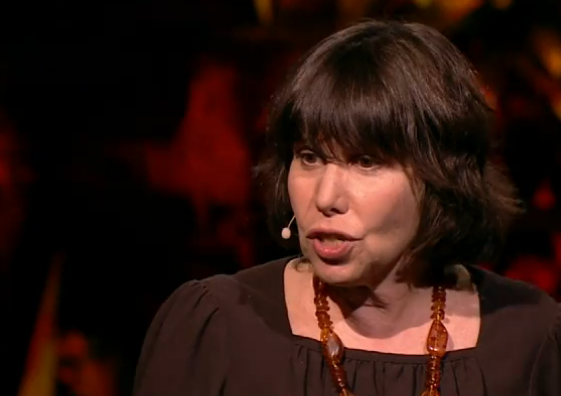So the question is: What would the baby give her, what they liked or what she liked?
但大家都想知道:寶寶會給她什么,是貝蒂喜歡的還是自己喜歡的?
And the remarkable thing was that 18 month-old babies, just barely walking and talking, would give her the crackers if she liked the crackers,
讓人驚訝的是18歲大的寶寶,雖然還沒有開始走路和說話,給了貝蒂餅干如果她喜歡餅干,
but they would give her the broccoli if she liked the broccoli.
但給了她花椰菜如果她喜歡的是花椰菜。
On the other hand, 15 month-olds would stare at her for a long time if she acted as if she liked the broccoli, like they couldn't figure this out.
另一方面,15歲大的寶寶會望著貝蒂,如果她說自己喜歡花椰菜,寶寶們還是不知道。
But then after they stared for a long time, they would just give her the crackers, what they thought everybody must like.
但在觀察了一段時間之后,他們給了貝蒂餅干,因為覺得所有人都會喜歡,
So there are two really remarkable things about this.
所以這項實驗有兩個值得關(guān)注的發(fā)現(xiàn)。
The first one is that these little 18 month-old babies have already discovered this really profound fact about human nature, that we don't always want the same thing.
首先是這些18個月大的孩子已經(jīng)開始注意一個人性的奧秘,那就是我們想要的東西不同。
And what's more, they felt that they should actually do things to help other people get what they wanted.
還有,他們意識到自己應(yīng)該做點幫助他人達(dá)成愿望的事。
Even more remarkably though, the fact that 15 month-olds didn't do this suggests that
但更讓人值得關(guān)注的是,15個月大的寶寶們沒有這種意識
these 18 month-olds had learned this deep, profound fact about human nature in the three months from when they were 15 months old.
說明18月大的懂得了一個人性的奧秘,而當(dāng)他們3個月前還沒有意識到。

So children both know more and learn more than we ever would have thought.
所以寶寶們知道的和學(xué)到的比我們想象中要多得多。
And this is just one of hundreds and hundreds of studies over the last 20 years that's actually demonstrated it.
而只是在過去20年里的上百項調(diào)查的其中之一證明了這個觀點。
The question you might ask though is: Why do children learn so much?
但是你也許想要問:小孩子為什么學(xué)到這么多呢?
And how is it possible for them to learn so much in such a short time?
在這么短的時間里,他們怎么能辦得到呢?
I mean, after all, if you look at babies superficially, they seem pretty useless.
我是說,如果你只從表面來觀察這些寶寶,他們似乎沒什么用。
And actually in many ways, they're worse than useless, because we have to put so much time and energy into just keeping them alive.
事實上在很多方面,他們比沒用還沒用。因為我們需要花如此多的時間和經(jīng)歷才能讓他們生存。
But if we turn to evolution for an answer to this puzzle of why we spend so much time taking care of useless babies, it turns out that there's actually an answer.
如果我們從進(jìn)化的角度來尋找,我們?yōu)槭裁匆ㄟ@么多時間來照料這些沒用的寶寶們的答案時,我們找到了一個答案。
If we look across many, many different species of animals, not just us primates, but also including other mammals, birds, even marsupials like kangaroos and wombats,
如果我們觀察各種不同種類的動物,不光是靈長類,包括其它哺乳動物和鳥類,還有有袋目哺乳動物,比如像袋鼠和袋熊,
it turns out that there's a relationship between how long a childhood a species has and how big their brains are compared to their bodies and how smart and flexible they are.
結(jié)果是,動物的孩童時期長度和它們的腦部大小與身體的比例,還有它們的智慧和靈敏是存在關(guān)系的。



